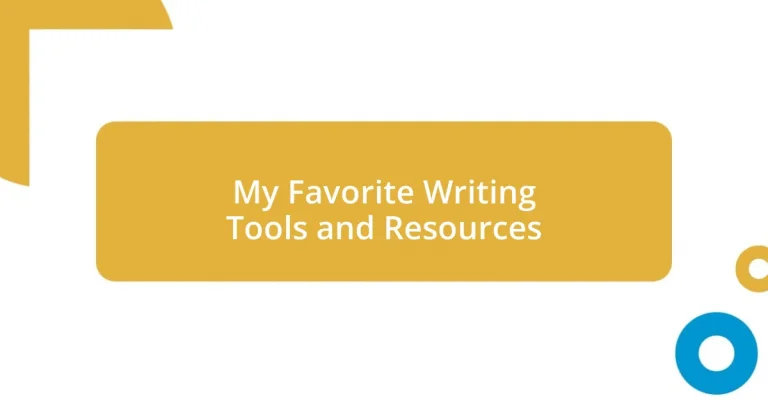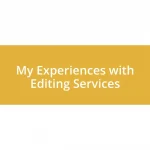Key takeaways:
- Essential writing tools like Scrivener, FocusWriter, and Grammarly enhance organization and help maintain a distraction-free environment.
- Cloud-based platforms such as Google Docs and Notion facilitate collaboration and streamline the writing process.
- Engagement with writing communities, like NaNoWriMo, provides support and motivation, making writing goals more achievable.
- Advanced techniques, including freewriting and reverse outlining, foster creativity and improve the overall quality of writing.
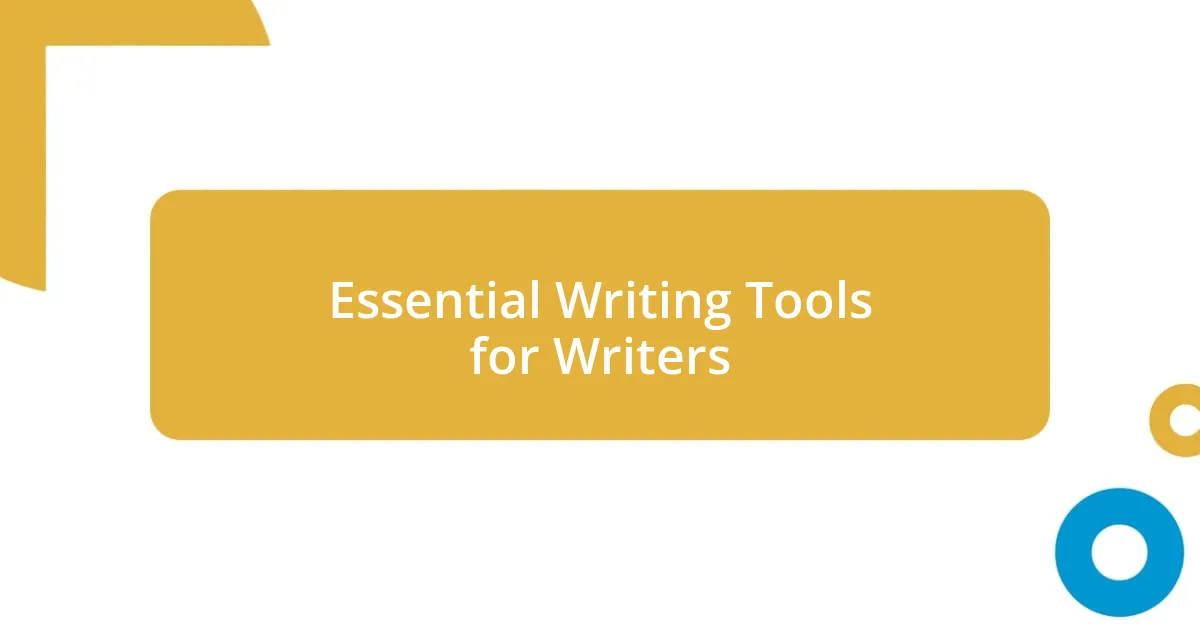
Essential Writing Tools for Writers
One of the essential writing tools I can’t live without is a good writing software. I remember the first time I tried Scrivener; it felt like finding my creative sanctuary. It’s not just about writing; it’s about organizing my thoughts in a way that makes sense. Have you ever grappled with messy notes scattered across different files? That’s where a tool like this shines, allowing you to streamline the entire writing process.
Then there’s the importance of a distraction-free writing environment. For me, using tools like FocusWriter helped me dive deep into my work without the usual clutter on my screen snapping at my attention. I often think, “Isn’t it amazing how a simple interface can free up your mind?” I’d argue that creating a space that encourages flow is vital for any writer.
Lastly, let’s not overlook the power of grammar and style checkers. When I stumbled upon Grammarly, I felt a wave of relief wash over me. It’s not just a safety net for typos; it guides me towards a more polished piece while I write. Have you ever sent off a draft feeling unsure? That’s why having a reliable tool to catch those pesky mistakes before sharing your work is an absolute game changer.
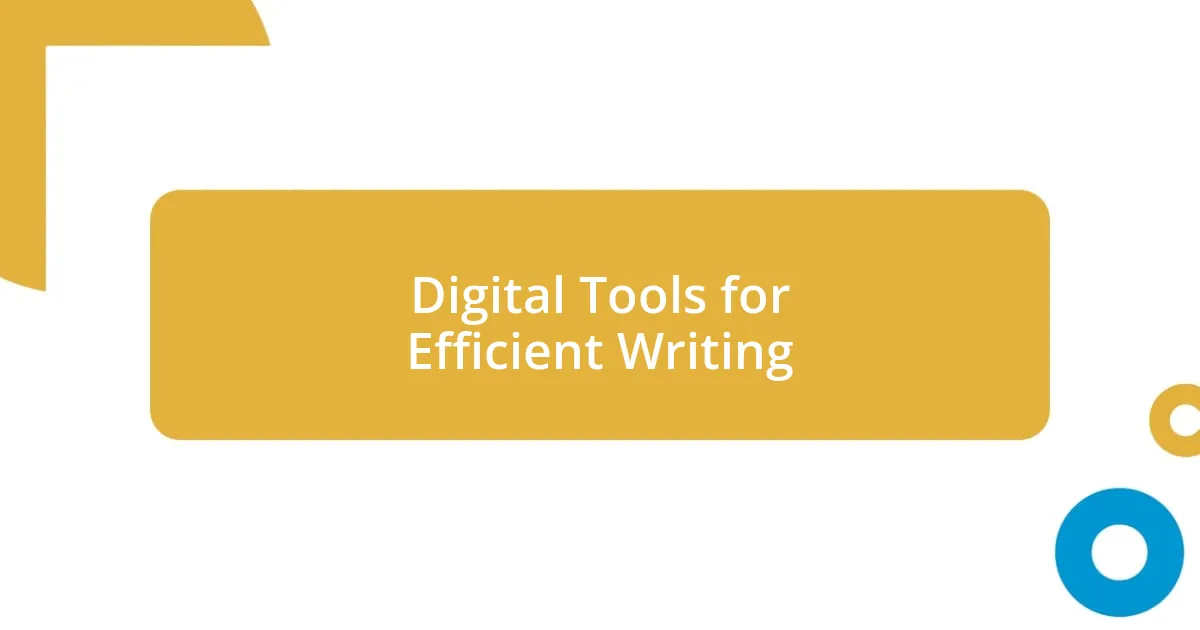
Digital Tools for Efficient Writing
When it comes to digital tools for efficient writing, I find that cloud-based platforms truly revolutionize the way I compose and collaborate. Google Docs, for example, has become a lifeline for me, especially during brainstorming sessions with fellow writers. I recall working on a group project late at night, tossing ideas back and forth in real-time, that feel of instant connectivity was exhilarating and inspired creativity like nothing else. It’s wonderful how these tools not only store your work but also create a communal space for feedback and growth.
Here are a few cloud-based writing tools that have made a significant impact on my writing efficiency:
- Google Docs: Collaborative writing in real time.
- Evernote: Organizing notes and ideas seamlessly.
- Trello: Managing writing projects visually.
- Notion: All-in-one workspace for notes, tasks, and writing.
- Microsoft OneNote: A digital notebook for jotting down thoughts on the go.
These tools have become part of my daily writing rituals, ensuring I stay organized and inspired.
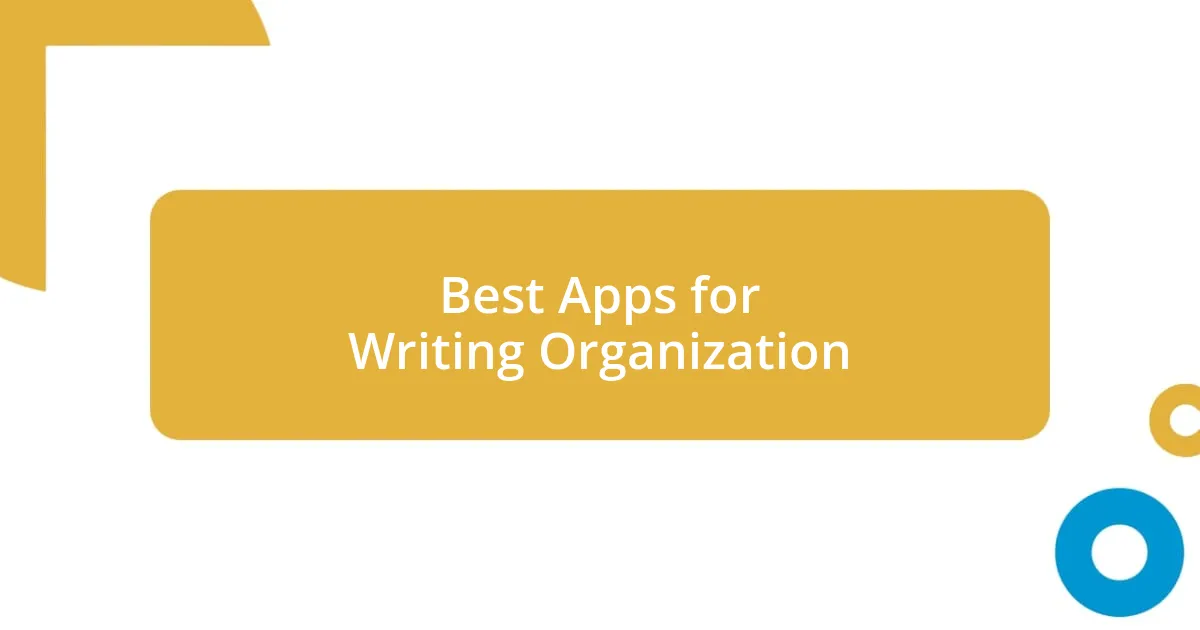
Best Apps for Writing Organization
When I think about writing organization, I can’t help but highlight Trello. Its visual layout transforms chaotic projects into manageable tasks. I remember creating my first Trello board for a novel I was working on. Seeing each chapter neatly categorized helped me tackle my daunting writing goal one step at a time, which was incredibly satisfying. Have you ever felt overwhelmed by a project? Trello can make those big tasks feel much smaller and more achievable.
Another fantastic app I’ve found is Notion. It’s like a Swiss Army knife for writers. I use it to track everything from character developments in my stories to detailed outlines and research notes. The integration of databases with text documents allows me to reference my notes effortlessly—no more hunting through folders for lost information. I even made a personal dashboard to gather all my writing projects in one place. Doesn’t that sound like a dream?
Here’s a quick comparison of some of the best apps for writing organization:
| App | Features |
|---|---|
| Trello | Visual task management with boards, lists, and cards |
| Notion | All-in-one workspace with notes, databases, and tasks |
| Evernote | Note-taking with organization features and web clipping |
| Google Docs | Real-time collaboration and cloud storage |
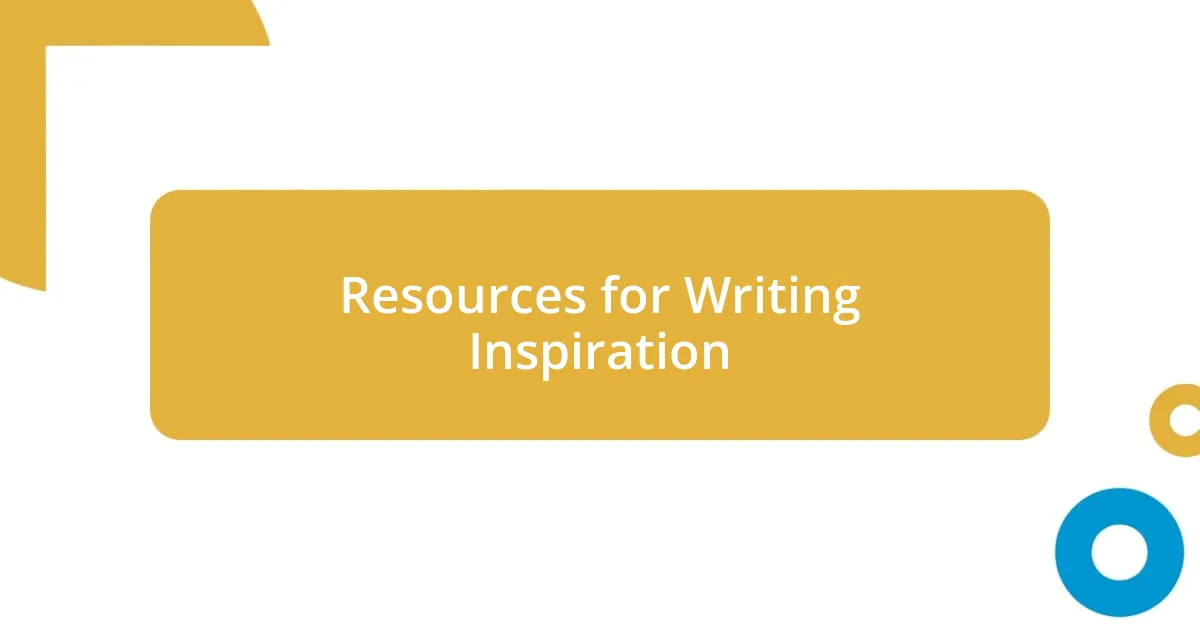
Resources for Writing Inspiration
Finding inspiration for writing can sometimes feel like hunting for treasure. One resource I turn to regularly is Pinterest. It’s filled with visuals and quotes that ignite my creativity. I remember scrolling through boards on character design and suddenly feeling the urge to jot down a new story idea. Have you ever had a moment where an image sparked a new direction for your writing? It happens all the time with me, transforming my blank page anxiety into a flurry of thoughts.
Writing prompts are another fantastic way to get the creative gears turning. I often find them in various online communities or even dedicated books. There’s something magical about a simple phrase that can take you on an unexpected journey. I once came across a prompt about a mysterious door that led to multiple realities. It pushed me to explore concepts I wouldn’t have normally considered. What if you found a door like that in your own life? Just think of the stories waiting to be unfolded!
Lastly, podcasts dedicated to writing can be a goldmine for inspiration. I enjoy listening to discussions about the writing process or interviews with authors I admire. I remember tuning into a podcast about overcoming writer’s block, and the host’s passion about their breakthrough techniques inspired me to return to my desk and push through my own barriers. So, have you found a podcast that shifts your perspective or fuels your motivation? I bet there’s one out there that speaks to your journey as a writer!
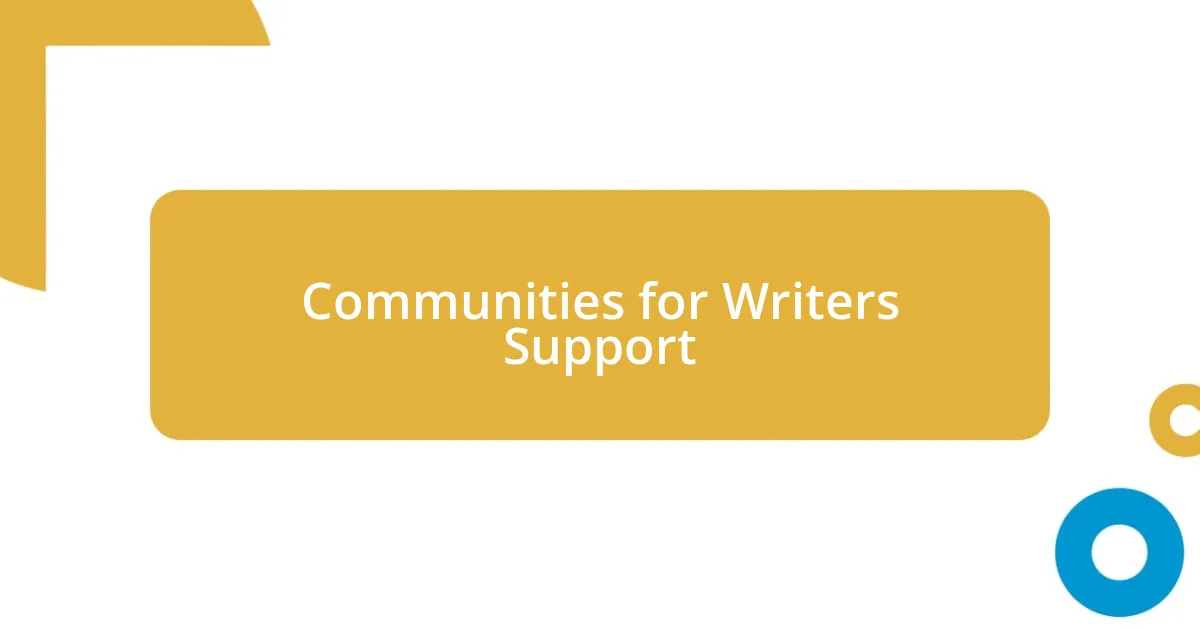
Communities for Writers Support
Joining a community of fellow writers can be a game-changer. I remember the first time I engaged with a writer’s group online. The sheer relief of knowing I wasn’t alone in my struggles was exhilarating. Conversations flowed effortlessly about our creative highs and lows, and the feedback I received on my drafts was invaluable. Have you ever shared your work and received insights that completely reshaped your perspective? I sure have, and it made me a better writer.
Social media platforms like Twitter and Facebook have numerous groups devoted to writing support. I can’t stress enough how helpful these spaces can be. Connecting with writers at all levels—sharing triumphs and challenges—has fostered a sense of camaraderie that I cherish. I still recall the excitement of my first Twitter writing challenge; not only did it push my creativity, but the encouragement I received from peers was truly uplifting. Isn’t it fascinating how a few words of encouragement can fuel your motivation?
One of my absolute favorite communities is NaNoWriMo (National Novel Writing Month), where writers gather each November to tackle the ambitious goal of writing a novel in thirty days. I’ve participated in this event multiple times, and each year, the energy from the community motivates me to push through those tough writing days. The shared sense of accomplishment at the end, when we collectively celebrate our progress, is something I’ll never forget. Have you ever been part of something that unified writers from all around the world? It’s a feeling like no other!
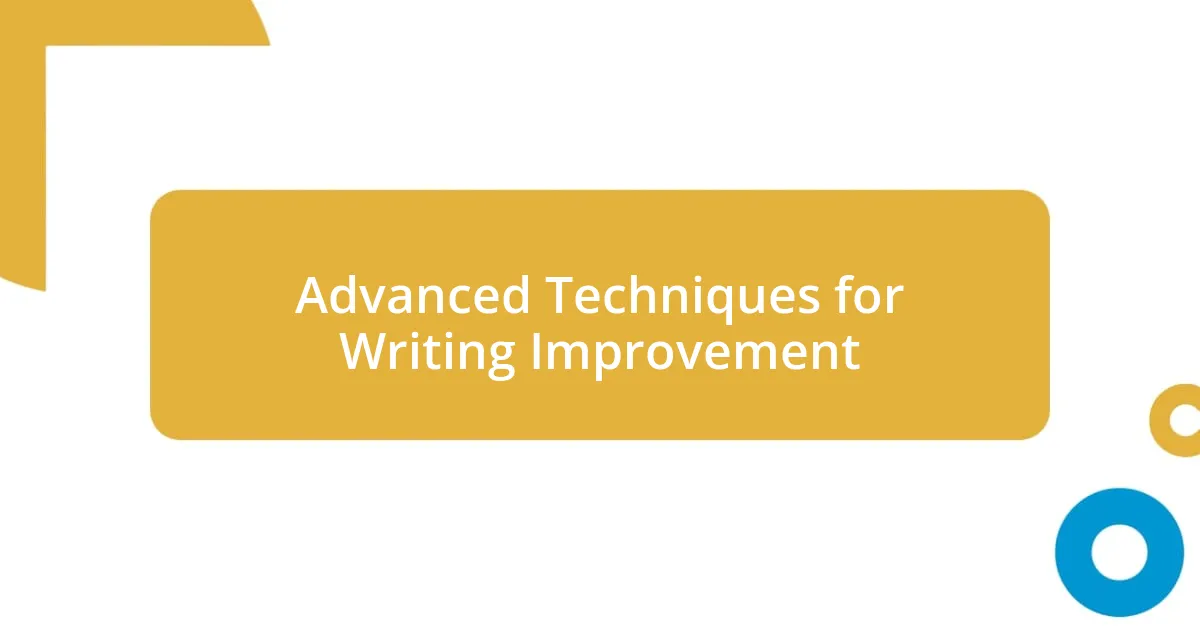
Advanced Techniques for Writing Improvement
Cultivating advanced writing techniques can elevate your craft significantly. One approach I find incredibly effective is freewriting—setting a timer for ten minutes and writing whatever comes to mind without worrying about grammar or coherence. It’s liberating! I remember doing this before tackling a challenging chapter, and the flood of ideas that followed opened up new paths I hadn’t considered. Have you ever let go like that? It might surprise you how much creativity flows when there are no rules.
Another powerful technique is reverse outlining. After drafting a piece, I take the time to create an outline based on what I’ve written. This helps identify gaps in logic or areas that could use more depth. I distinctly recall doing this on a short story that needed tightening. The clarity I gained not only improved the coherence but also reignited my passion for the piece. Have you ever looked at your work from a different angle and suddenly seen ways to enhance it? It’s a game-changer.
Engaging with peer critiques can also sharpen your writing. I’ve found that sharing my work with trusted fellow writers encourages me to embrace constructive feedback. Once, a friend pointed out an inconsistency in a character’s motivation that I’d overlooked. At first, I felt defensive, but after some reflection, I realized it was crucial for the story’s integrity. Have you ever found a critique that led to a significant breakthrough in your writing? Sometimes, the best insights come from those who see your work with fresh eyes.












